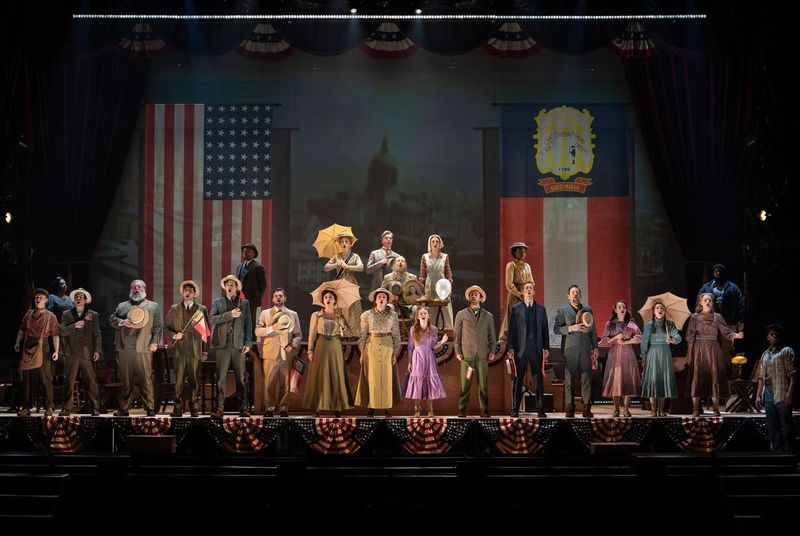
‘Parade’ – Book by Alfred Uhry; Music and lyrics by Jason Robert Brown; Co-conceived by Harold Prince; Directed by Michael Arden; Choreography by Lauren Yalango-Grant & Christopher Cree Grant; Music direction by Charlie Alterman. At the Emerson Colonial Theatre, Boston, through March 23rd.
By Shelley A. Sackett
It was with trepidation that I attended opening night of “Parade,” now at the Emerson Colonial Theatre through March 23. After all, the premise of the 2023 multiple Tony Award-winning musical revival is hardly uplifting. The book by Alfred Uhry (author of “Driving Miss Daisy”) is set in 1913 Atlanta and tells the true story of Leo Frank, a transplanted Brooklyn Jew and pencil factory supervisor who is married to his Jewish boss’s daughter, Lucille. As the newlyweds struggle to carve out their lives in the red hills of Georgia, Leo is falsely scapegoated for the murder of a 13-year-old white girl in his employ. The rest of the play dramatizes his trial, imprisonment, and 1915 mob lynching.
In the current climate of rampant disinformation and antisemitism, it’s easy to understand why some might eschew entertainment that is grounded in both.
At no point does the 180-minute show (one intermission) shroud the wretched facts of the case and the ginned up hate, prejudice and calculated lies that fueled Atlanta’s judicial, political and journalistic engines. Yet, like alchemy, first-rate staging, talent and especially Jason Robert Brown’s rapturous Tony Award-winning score of 29 songs transform this cheerless tale into a riveting musical production that scratches well below the surface to examine just what made the Jim Crow South tick.
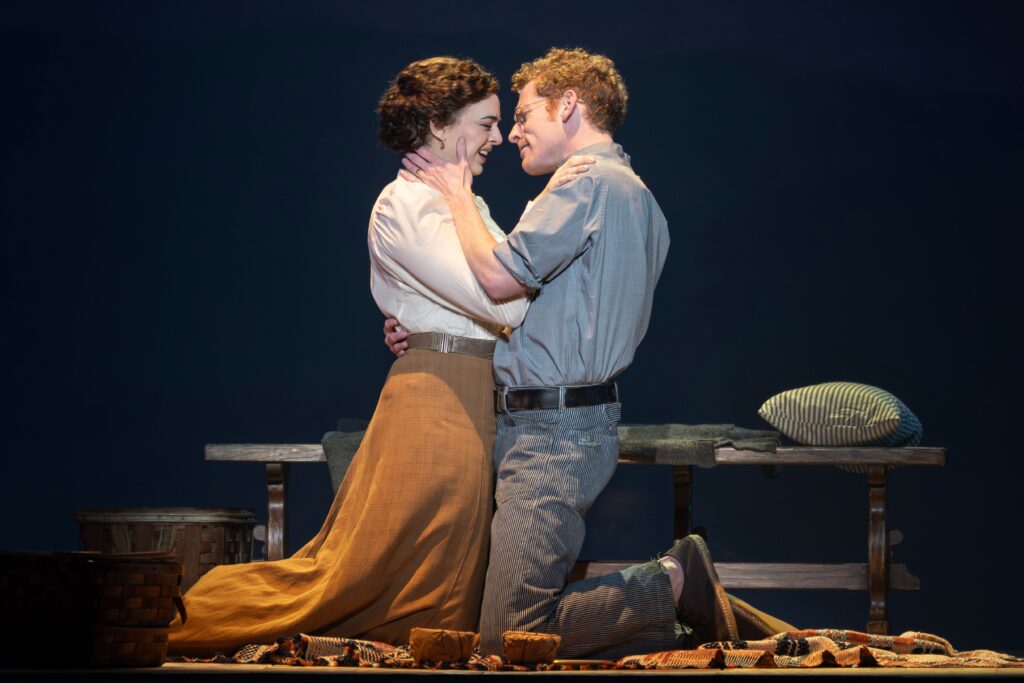
The stage is minimally set (design by Dane Laffrey) with a high and low platform that will magically evoke the Franks’ home, a witness box, a factory, a soapbox, a cell and a governor’s mansion. Throughout the show, background projections display real photographs, names and dates of the play’s characters as well as archival photos of 1910s Atlanta, newspaper stories and the “Leo Frank Lynching” memorial plaque in Marietta, Georgia. These both make the action easier to follow and remind us that “Parade” is based on truth.
The play opens in 1863 Marietta (“The Old Red Hills of Home”) as a young soldier leaves his lover for battle. Fifty years later, Atlantans still romanticize and mythologize the glories of the Civil War’s “Lost Cause” with Confederacy Day, which is when we first meet Leo and Lucille Frank.
“Why would anyone want to celebrate losing a war?” Leo (a pitch perfect, exceptional Max Chernin) asks his wife. Wiry, prickly and bespeckled, he struggles to fathom the mores of Atlantans. “For the life of me, I can’t understand how God could create people who are Jewish and Southern at the same time,” he bemoans.
Lucille (Talia Suskauer, whose voice seems directly wired to her emotions) doesn’t understand Leo’s Yankee manners any better than he grasps the ways of a Jewish southern belle. We are left wondering what drew these two to each other in the first place. Their singing selves couple in a soaring intimacy that their characters just can’t mirror.
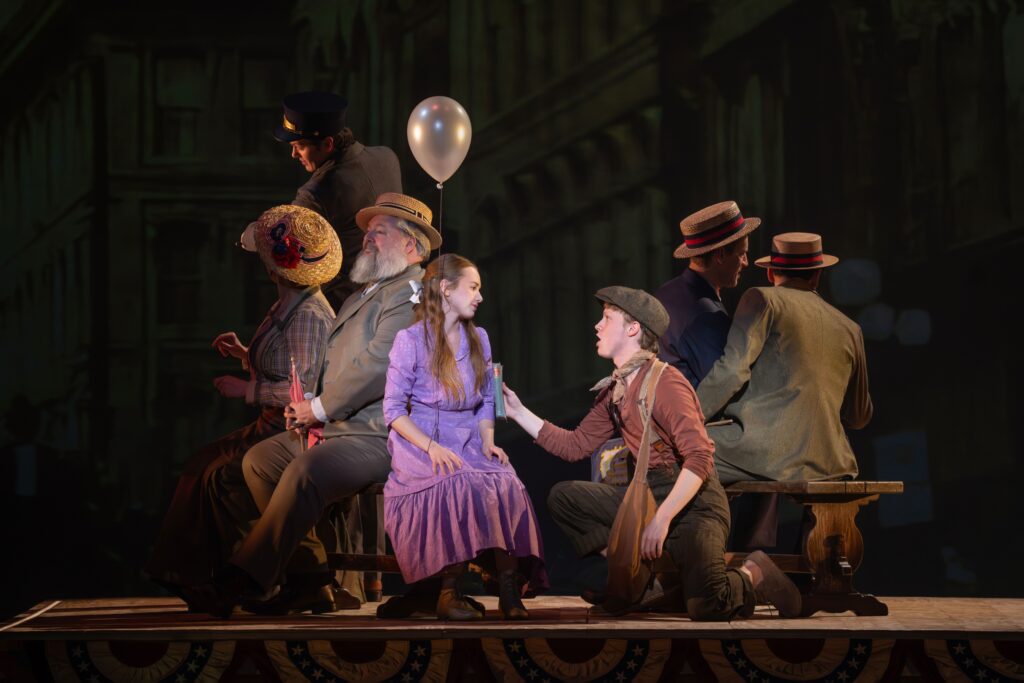
Their marital conflict pales compared to the troubles that unfold when the body of Mary Phagan is discovered in the factory. Two suspects are ripe for the picking: Newt Lee, the Black night watchman, and Leo Frank. That Leo is a self-absorbed workaholic who carries himself with a supercilious self-importance may make him hard to like, but his downfall is no less tragic.
District Attorney Hugh Dorsey (a believably slimy Andrew Samonsky) needs a conviction, and hanging another Black “ain’t enough.” The professional boost he seeks requires something more. This time, he’ll need to hang “the Jew.” He suborns testimony from many sources, threatening and cajoling even the Frank’s loyal maid, Minnie. Ex-con Jim Conley (Ramone Nelson in a barnstorming, show-stopper of a performance) fabricates eye witness evidence to save his own skin, yet ends up back on the chain gang when Donley double crosses him. Newspaperman Britt Craig (Michael Tacconi) hails the resurrection of his career as he stokes antisemitic hysteria and catches the eye of his editor.
Atlantans are only too happy to take the bait and, as Act I ends, Leo is swiftly convicted, sentenced to death and jailed.
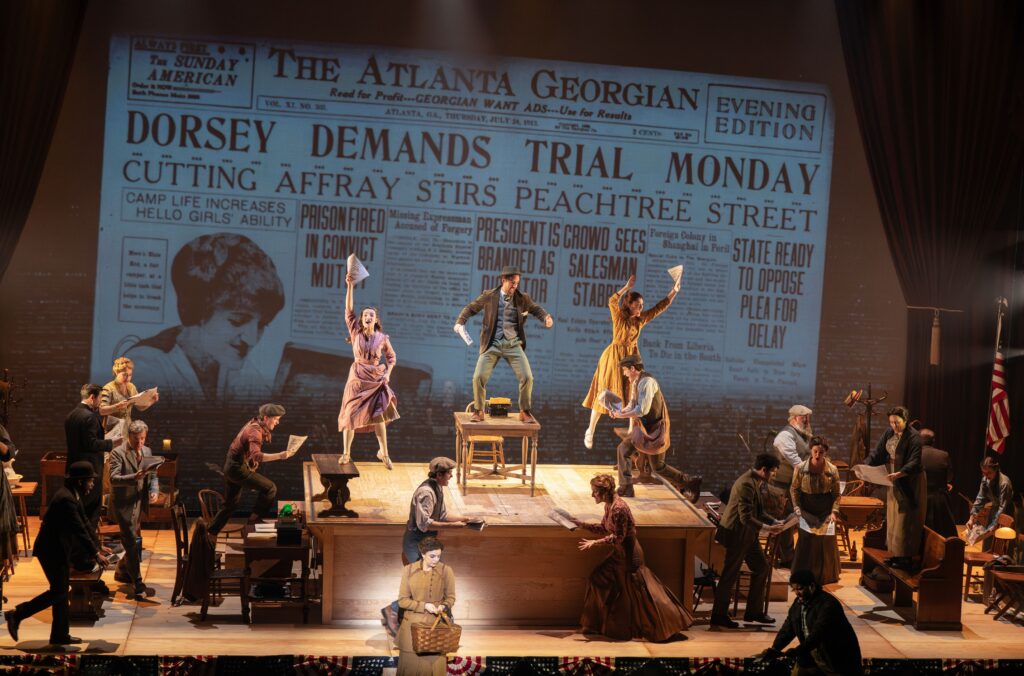
Director Michael Arden’s staging at several critical moments expands “Parade’s” theatricality and our access to Leo’s opaque interiority. Now imprisoned, Leo spends the entire intermission sitting onstage with his head in his hands. Shed of his cocky, brittle skin, he presents as more grounded and relatable. Although jarring, having Leo mime the false testimony of others during his trial is another stroke of dramatic brilliance.
Act II shifts to Leo and Lucille’s marriage, which is strengthened by his imprisonment and their joint efforts to prove his innocence. Eventually, Governor Slaton (a solid Chris Shyer) heeds Lucille’s pleas and, after investigating, commutes Leo’s sentence to life. His fate has already been sealed in the book of public opinion, however, and he is kidnapped and hanged.
With this storyline fully established from the prologue, it is indeed a wonder that “Parade” feels as dynamic, affective and —yes — entertaining as it does. Make no mistake; this is a first rate Broadway production with a lot going for it.
The cast of vocal performers (particularly the leads and Nelson) is, with few exceptions, extraordinary, and they have a lot to work with in Brown’s marvelous score. Backed by a terrific orchestra, Brown’s Sousa-style marches, work songs, haunting duets and raw blues and efficient, targeted lyrics achieve more than a page of dialogue might. While injustice and inhumanity are ever present, they simmer and percolate rather than boil over. Granted, some of the actors’ accents need polishing and the characters’ unambiguous goodness/evil renders them somewhat two-dimensional, but the timeliness and relevance of this ongoing story is almost reason enough to see it.
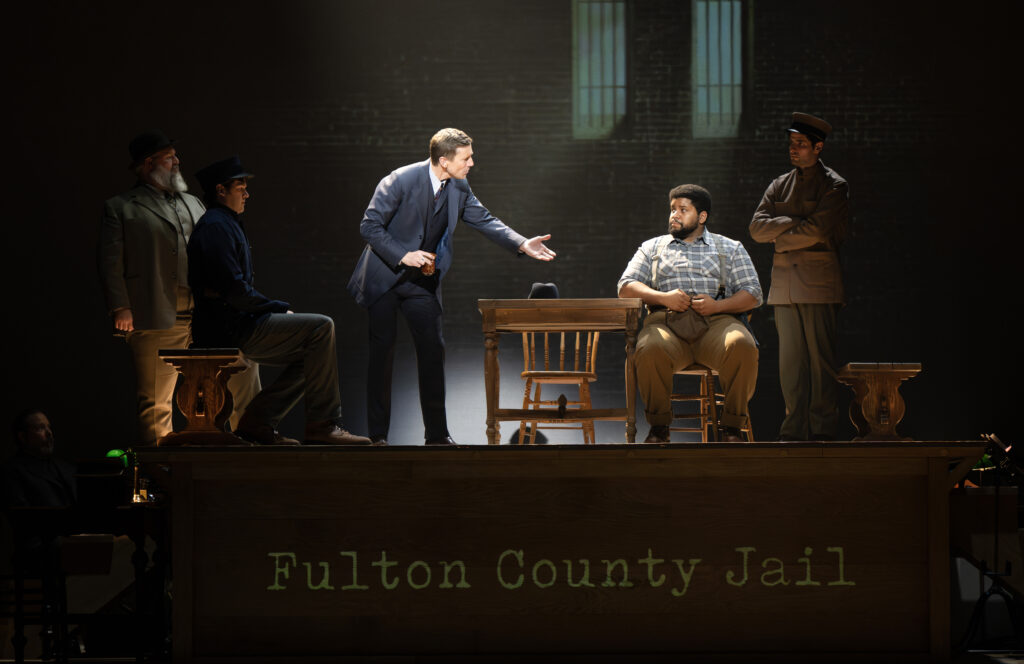
The wave of antisemitism that results in Leo’s conviction and lynching led to both the formation of the Anti-Defamation League and the resurgence of the Ku Klux Klan, both still significant forces. When the chorus of white Georgians chants, “hang ‘im, hang ‘im, make him pay,” it’s impossible not to hear the January 6 refrain and feel its aftershocks. As “Parade” points out, although Leo Frank’s death sentence was commuted, the case, reopened in 2019, is ongoing. Mary’s killer was never found. Unlike the more than 300 cases overturned thanks to the Innocence Project, he has never been exonerated.
As Leo is about to be hanged, right before chanting his final “Shema,” he states, “God chose me for a plan. I don’t know what it is.” Perhaps, at this time of thinking about who gets to write history’s story, one thread of that unknown plan is to broaden the inquiry and ask ourselves who had to pay for those stories we get to tell, and at what price?
For tickets and more information, visit emersoncolonialtheatre.com/

